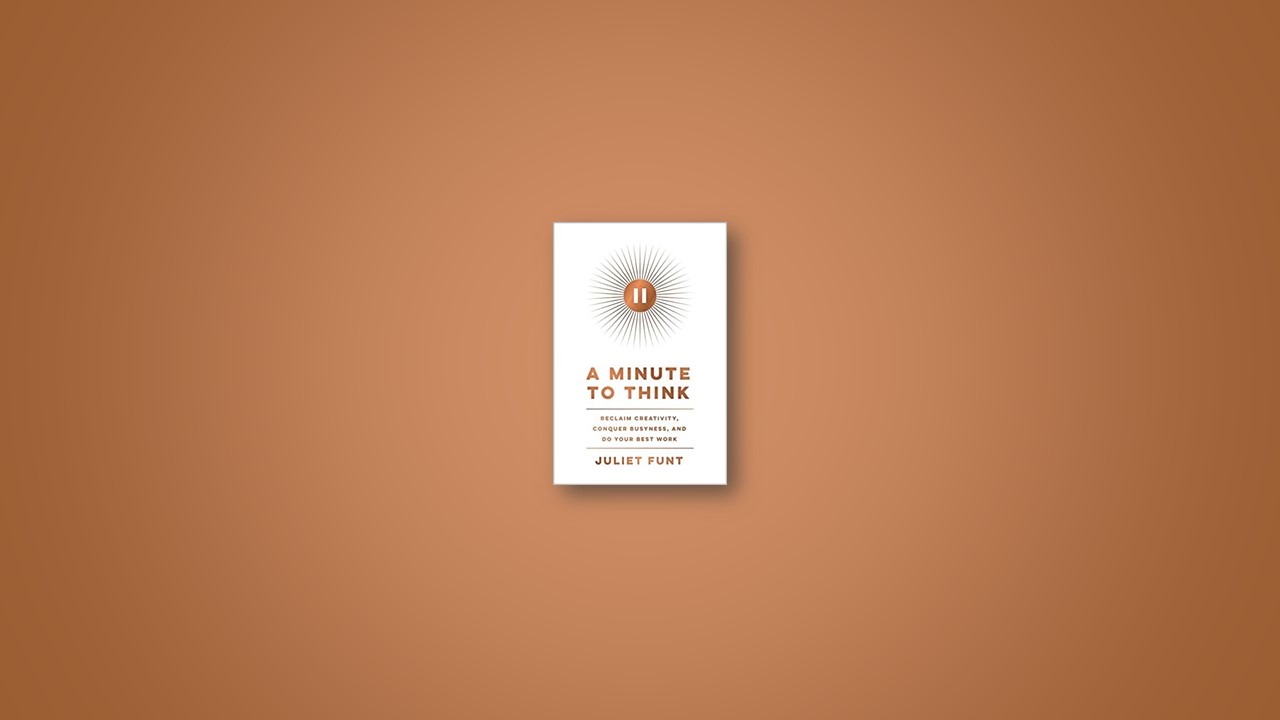The Missing Element: Our Hidden Yearning for Space
White space is the missing element in work and in life. It’s necessary in order to bring oxygen back into your busy, overflowing days.
This element has been taken from you by the pace and pressures of the Age of Overload, in which we all live and work.
Filling all the pauses that naturally occur in your day with endless activity obstructs your white space.
Taking strategic pauses in between the beats of life allows us to access our white space and creates time for thinking, reflection, rest, and creativity.
When you give yourself permission to pause, it makes everything you do better.
The False God of Busyness: Why Work Is so Much Work
Insatiability—the desire to constantly want more and better of everything—must be understood and questioned.
Social conformity reinforces problematic beliefs and habits. Positive conformity can change this paradigm.
We have too much complacency around low-value tasks and wasteful work, which are extremely expensive in terms of human energy and talent time.
Adding mortar (behavioral changes) to the bricks (logistical changes) makes the house of efficiency we are building more stable.
The Strategic Pause: Making Space a Daily Reality
Multiple research studies confirm that pauses are good for performance, creativity, and stamina.
Many successful leaders attribute dedicated “time to think” as an essential element to their success.
We may use our strategic pauses to recuperate, reduce, reflect, or construct.
Inserting the Wedge between tasks and activities is a powerful way to regain thoughtfulness and calm.
White space can be hijacked by negative thinking, but scheduling worry can keep it in check.
The Thieves of Time: Identifying the Forces against Us
Four key forces fuel our overload—Drive, Excellence, Information, Activity. They are appropriately considered assets yet when taken to extremes become corrupted.
The Thief of Drive tells us to “do it all” and is associated with burnout and overdrive.
The Thief of Excellence tells us to bring our exacting high standards to all work and is associated with perfectionism.
The Thief of Information tells us that more data and research is always better and is associated with overload.
The Thief of Activity tells us that we should always keep going and doing and is associated with frenzy.
The Simplification Questions: Reclaiming the Best by Removing the Rest
By using the strategic pause to be reductive and de-crapify your day—you can find more room for meaningful work.
Four questions will help you artfully direct the application of Drive, Excellence, Information, and Activity.
Is there anything I can let go of? (for Drive)
Where is “good enough,” good enough? (for Excellence)
What do I truly need to know? (for Information)
What deserves my attention? (for Activity)
It is beneficial to slow down and observe first, like an anthropologist, before removing tasks, projects, or to-dos.
Hallucinated Urgency: Unhooking from the Culture of Now
Much of what you consider urgent in reality is not.
The three categories of urgency will help you recalibrate what’s immediate and what can wait:
NOT TIME SENSITIVE: When an immediate answer is not needed.
TACTICALLY TIME SENSITIVE: When fast action is tied to a business result.
EMOTIONALLY TIME SENSITIVE: When a feeling of urgency stems from emotion, curiosity, or stress.
Parking your non–time sensitive requests and needs on the Yellow List will streamline your communication and reduce email and messaging.
When you curb urgency, your executive presence will become stronger.
Vacation time is critical to focus and creative contribution. We should not let false urgency steal it from us.
The Tool That Turned on Us: Defeating the Email Beast
Email is addictive for many and lures us to be in constant contact with it.
To break free from the consuming nature of email, you must learn to touch it less and compose it better.
The email shadow can overtake you when you go into your inbox between checks.
Thoughtful and effective emails are written through the lens of clarity, brevity, and punch.
How the Best Teams Talk: Elevating Our Communication
Language is the realm in which many personal goals are made real. Skillful, clear, and brave communication fixes so much.
Choosing the correct medium for the message (2D vs. 3D) will save time and add richness to your communications.
The 50/50 Rule says that anything that bothers you at work is 50 percent your responsibility until you have asked for what you want.
The No Sandwich suggests that saying no will be easier if delivered between two slices of graciousness.
Appreciations spoken out loud will fill two hearts—yours and theirs.
Meetings Done Better: Experiencing the Gains of Getting Together
Becoming aware of boredom, without digitally multitasking to mute it, will help you determine when you’re in a state of SBH (Shouldn’t Be Here).
Being cautious about the meeting invitation process on both sides—inviting and accepting—adds meeting-free hours to your day.
Hall Time is the space scheduled between meetings, which creates pauses to digest, refresh, or prepare.
When making comments and contributions in a meeting, ask yourself: Is it kind? Is it honest? Is it necessary?
The White Space Team: Creating New Norms Together
A “norm” is an authoritative standard or a principle of action binding members of a group. “Culture” refers to all the norms of your organization put together.
You can take steps toward team and organizational liberation by starting with yourself and the aspects of your work and life you can control.
Sharing the how of any new practice you implement with others makes it interesting, concrete, and doable.
If you’re a leader, your modeling of these principles is critical to everyone around you.
Patience is an important tool. It gives others time to get curious and begin adopting their own small and large changes.
Life beyond Work: Don’t Miss the Ride
Professional achievement is not a substitute for happiness, personal connection, and meaning.
Many people eventually experience intense regret for having worked too hard. This regret can be avoided by having more white space with your loved ones and passions.
The Thieves of Time—Drive, Excellence, Information, and Activity—show up at home in our compulsive and competitive doing, comparing, and overachieving.
In order to have a life at home with depth, you must dethrone your devices so you can be present for the people who matter most.
If you’re a parent, it’s never too late to slow down, pay attention, and share white space with your children.
Don’t miss the ride.


